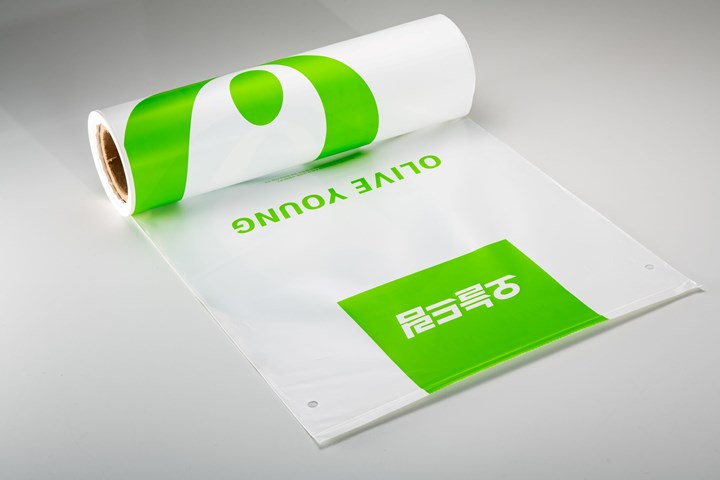CJ Biomaterials PHA-Based Polybag Makes Same-Day Delivery More Sustainable
New polybag provides similar properties to traditional PVC bags, including durability, opacity and adhesive properties.

A new biodegradable polybag has been developed by CJ Biomaterials (U.S. office Woburn, Massachusetts) that is said to have properties similar to traditional polybags made from PVC. According to the company, the bags will be used by South Korea-based health and beauty retailer CJ Olive Young, enabling a sustainable solution for the company’s same-day delivery service. The polybag was manufactured by one of CJ Biomaterials’ partner converters in Korea, named ‘Jo Eun Pack’.
CJ Biomaterials researched how its PHA technology could be used to replace PVC, and it successfully created a bag with properties that are similar to those of typical options. With the increased biocontent, these bags that incorporate PHA are durable enough to carry heavy or sharp-edged items without tearing. They are said to have excellent opacity, preventing contents from being visible from the outside. The bags also have adhesive properties that enable shipping labels to be applied and easily remain in place, making it suitable for multiple applications where polybags are necessary.
According to strategic marketing v.p. Heidi Lebel, although PHA is marine degradable, the polybag is not as it is not 100% PHA based. “We cannot disclose the whole composition of this polybag, but what we can share is that compostable or biodegradable materials were used to make this polybag with PHA. CJ Biomaterials is trying to develop products that are more economical and functionally superior,” Lebel says. She also explains that in Korea, the policy/regulation environment or awareness of biodegradable materials or products is evolving, as a result, the company was unable to secure biodegradable certification for the polybag itself. However, because other compostable or biodegradable materials were used in addition to PHA, it is assumed the polybag can also be composted in industrial conditions.
Related Content
-
How to Optimize Your Molds and Hot Runners for Processing Bioresins
Demand for bioresins is growing in molded goods, particularly as a sustainability play to replace fossil-fuel based materials, but these materials are not a drop-in replacement for traditional materials. Molds and hot runners need to be optimized for these materials.
-
How to Extrusion Blow Mold PHA/PLA Blends
You need to pay attention to the inherent characteristics of biopolymers PHA/PLA materials when setting process parameters to realize better and more consistent outcomes.
-
ICIS Launches: Ask ICIS Generative AI Commodities Assistant
Said to be the first of its kind, this AI assistant will enhance access to ICIS’ intelligence and insights for the energy and chemical markets.





